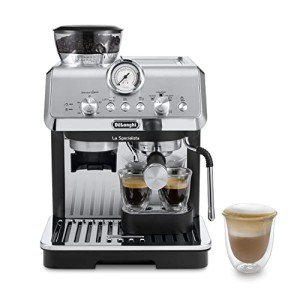The 10 Most Scariest Things About Home Use Espresso Machines
Home Use Espresso Machines: A Comprehensive Guide
Espresso machines have become a staple in numerous homes as coffee enthusiasts seek to duplicate café-quality brews in the comfort of their kitchens. The increase in appeal has caused a diverse market filled with various designs, features, and costs. This article aims to supply a helpful overview of home use espresso machines, assisting readers browse their options effectively.
Understanding Espresso Machines
Espresso machines work by requiring warm water through finely-ground coffee under high pressure, leading to a focused coffee beverage understood as espresso. There are numerous types of espresso machines categorized based upon their brewing techniques and level of automation. The most common types include:
Manual Espresso Machines: These require the user to manage the pressure and water circulation, enabling for a more hands-on coffee-making experience.
Semi-Automatic Espresso Machines: These use automatic control over water pressure, while the user by hand grinds and tamps the coffee.
Automatic Espresso Machines: With the push of a button, these machines automatically control the circulation of water, making it easier to brew espresso with consistent outcomes.
Super-Automatic Espresso Machines: These all-in-one machines handle grinding, tampering, brewing, and even milk frothing, making them ideal for users looking for convenience.
Capsule or Pod Machines: These use pre-packaged coffee pods to produce espresso with very little effort, however they restrict option in brewing strategies and tastes.
Table: Comparison of Espresso Machine Types
Type
Control Level
Ease of Use
Cleaning up Level
Perfect For
Manual
User-controlled
Moderate
High
Coffee purists
Semi-Automatic
Partial automation
Moderate
Moderate
Home baristas
Automatic
Fully automated
Easy
Low
Hectic people
Super-Automatic
Totally automated
Extremely simple
Very low
Convenience applicants
Capsule/Pod
Completely automated
Really easy
Extremely low
Casual drinkers
Key Features to Consider
When picking a home use espresso machine, it's vital to think about numerous functions that can considerably affect the quality of espresso and user experience.
Pressure: Look for machines that offer a minimum of 9 bars of pressure, as this is considered optimum for developing espresso.
Boiler Systems: Single vs. dual boiler systems figure out temperature stability and the capability to brew espresso and steam milk at the same time.
Grinder: Integrated mills allow for freshly ground coffee, which enhances taste. Think about machines with adjustable grind settings.
Milk Frother: For those who enjoy coffees and lattes, a built-in steam wand or automatic frother is important.
Size and Design: Consider your kitchen area and aesthetic preferences. Machines are available in various sizes, from compact to big setups.
Rate: Home espresso machines can range from a few hundred to several thousand dollars, so it's essential to establish a budget before exploring options.
Pros and Cons of Home Use Espresso Machines
Pros
Cons
Benefit of brewing coffee in the house
Preliminary financial investment can be high
Quality of espresso is typically exceptional
Requires some ability, particularly with manual machines
Capability to experiment with flavors
Upkeep and cleaning can be labor-intensive
Can conserve cash in the long run
Not all machines will match every coffee choice
Upkeep and Cleaning Tips
Preserving an espresso machine is crucial for lengthening its life and guaranteeing constant brew quality. Here are some beneficial suggestions:
Regular Descaling: Minerals from water can develop in the machine. Descale every 1-3 months, depending upon water hardness.
Daily Cleaning: Rinse portafilters, baskets, and steam wands after each use to avoid coffee oils from building residue.
Use Filtered Water: This can help minimize mineral accumulation and enhance the taste of coffee.
Change Gaskets and Seals: These parts may wear with time and should be replaced to maintain pressure and efficiency.
Check out the Manual: Each machine has particular care instructions; following these will ensure durability.
Frequently Asked Questions About Home Use Espresso Machines
**Q1: What is the best budget espresso machine?The best budget espresso machine typically depends upon specific requirements, however models like the DeLonghi EC155 or the Breville Bambino are popular amongst users for offering fantastic value. Q2: How long do home espresso machines generally last?With correct maintenance, home espresso machines can last anywhere from 5 to 15 years, depending on the quality of the machine and frequency of use. Online Espresso Machines Store : Can I make cappuccinos and lattes with any espresso machine?While most espresso machines can make cappuccinos and lattes, having a reputable
steam wand or frother is vital for accomplishing the right milk texture.
Q4: Are super-automatic machines worth the investment?For those who focus on benefit and quick developing, super-automatic machines can be worth the financial investment, though they might do not have some customizability in brew strength and taste. Q5: What types of coffee beans are best for espresso?While personal preference contributes, beans identified as” espresso “blends are generally roasted darker, producing rich flavors and a velvety texture when brewed.
Investing in a home espresso machine can transform the day-to-day coffee routine into something special, raising home brews to café quality. By understanding the various kinds of machines, essential features to think about, maintenance needs, and weighing the
pros and cons, consumers can make educated decisions that match their specific preferences. As the espresso culture continues to grow, no matter the choice, every brew can be a delicious experience waiting to be savored.  **
**